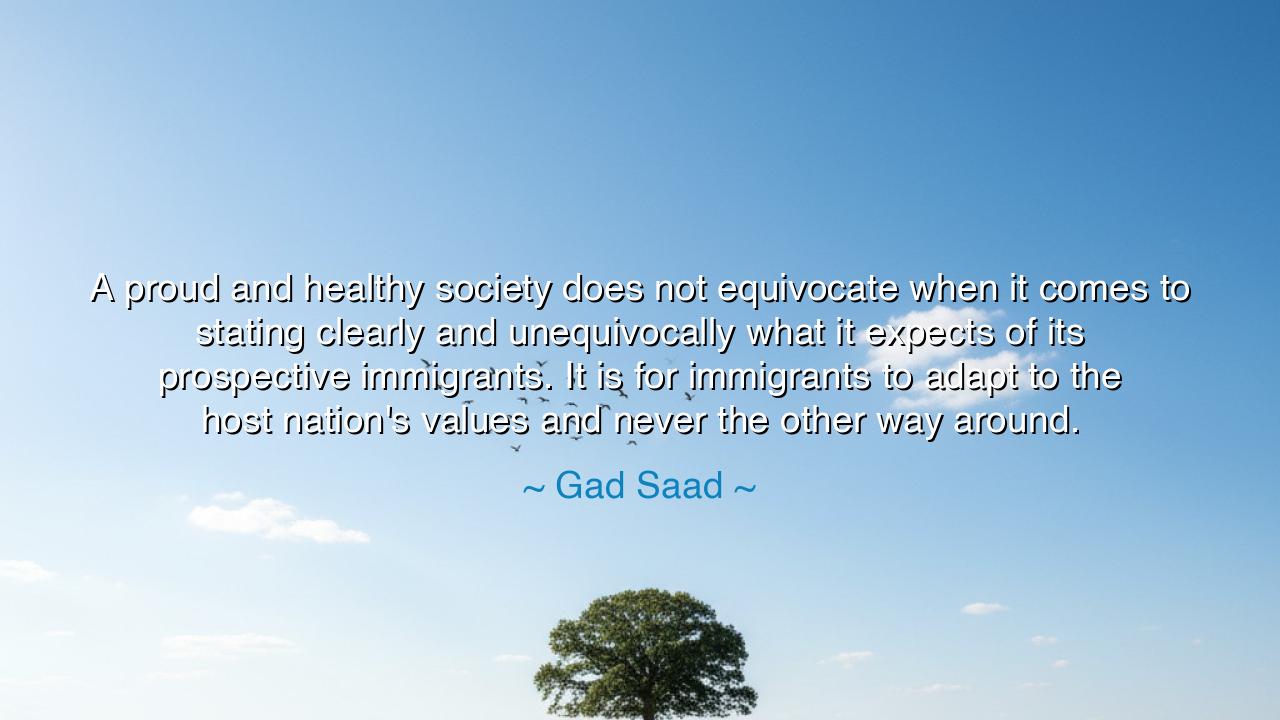
A proud and healthy society does not equivocate when it comes to
A proud and healthy society does not equivocate when it comes to stating clearly and unequivocally what it expects of its prospective immigrants. It is for immigrants to adapt to the host nation's values and never the other way around.






Gad Saad, the fierce defender of reason in a world often swayed by sentiment, once declared: “A proud and healthy society does not equivocate when it comes to stating clearly and unequivocally what it expects of its prospective immigrants. It is for immigrants to adapt to the host nation’s values and never the other way around.” His words are both a warning and a call to strength, spoken in an age when cultures wrestle with questions of belonging, identity, and survival. They remind us that a civilization without confidence in its own values risks dissolution, while one that stands firm preserves its legacy for generations to come.
The meaning of this quote is twofold. First, a society must know itself—its virtues, its traditions, its moral compass—if it wishes to endure. To equivocate, to blur or to dilute what it stands for, is to invite confusion and fracture. Second, those who enter a land as immigrants must not seek to remake it in the image of their former homes but to embrace the values of the nation they have chosen. This does not deny their humanity or heritage, but it calls them into unity with their new people. In this way, the host nation remains strong, and the newcomers find the dignity of belonging.
History confirms this truth with both triumphs and tragedies. Consider ancient Rome, a vast empire that welcomed countless peoples into its fold. For centuries, its strength lay in requiring those who entered to embrace Roman law, Roman citizenship, and Roman identity, even as they retained traces of their origins. This unity built an empire that stretched across continents. But in its later years, when Rome weakened in its insistence on shared values, fragmentation took root. Loyalty shifted from Rome to tribe, and the empire dissolved beneath its own divisions. Saad’s words echo this lesson: without clarity, a society loses its cohesion.
Another striking example lies in the story of the United States. For centuries it has drawn immigrants from across the world, each seeking liberty and opportunity. The promise of the “American Dream” was not that all would remain separate, but that all would be woven into one fabric: “E pluribus unum”—out of many, one. The expectation was adaptation to the values of democracy, rule of law, and individual freedom. When this unity was held firm, the nation flourished. But when factions began to demand that the host society bend entirely to their separate customs without seeking balance, the spirit of unity was tested. Here again, Saad’s words hold weight: adaptation must flow toward the host, not the other way around.
Yet his statement is not a cry for cruelty, but for responsibility. A proud society welcomes the stranger, but with boundaries. A healthy society opens its arms, but not at the cost of its own identity. To be too rigid is to deny compassion; to be too yielding is to invite collapse. The wisdom lies in balance: charity toward the newcomer, firmness in expectation. For only when both are present can harmony arise between guest and host.
The lesson for us, then, is this: do not despise your own values, and do not shrink from stating them clearly. Teach them to your children, guard them in your laws, and speak them to those who come seeking refuge or opportunity. At the same time, honor the courage of the immigrant, who leaves behind the familiar to embrace the unknown. But never confuse hospitality with surrender—unity comes not from a nation bending to each newcomer, but from newcomers embracing the nation’s enduring spirit.
Practical actions follow naturally. As citizens, affirm what your country stands for and live by those principles. As leaders, articulate expectations clearly and enforce them justly. As immigrants, seek not to erase your host’s heritage, but to enrich it through loyalty and shared purpose. And in daily life, remember that strength and compassion are not opposites, but companions: a people secure in their values can open their arms wide, while a people unsure of themselves will falter.
Thus, let Gad Saad’s words be remembered: “A proud and healthy society must expect its immigrants to adapt to its values.” This is not arrogance, but survival. For only a people who know who they are can endure the passage of time, welcoming the stranger while guarding the flame of their own identity. And in that flame, if it is kept alive, both native and newcomer may find warmth, belonging, and a shared destiny.






AAdministratorAdministrator
Welcome, honored guests. Please leave a comment, we will respond soon